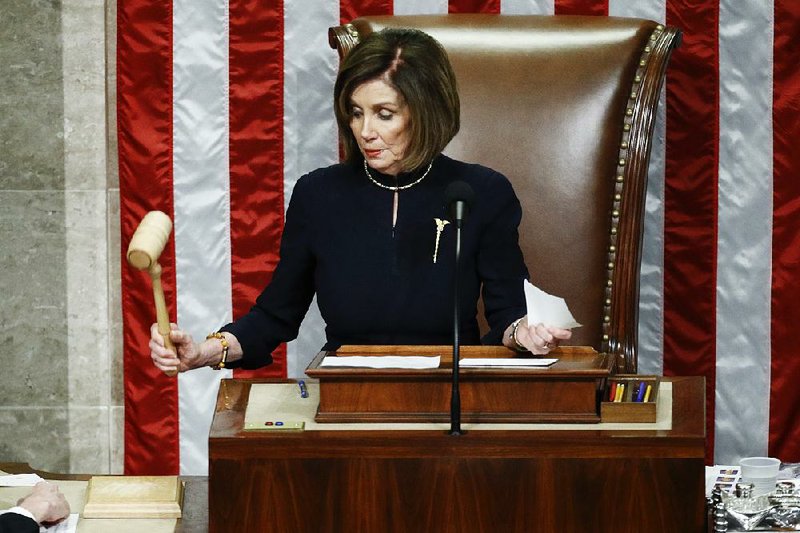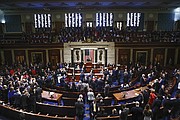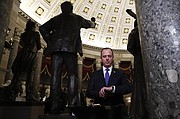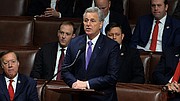WASHINGTON -- The House of Representatives on Wednesday impeached President Donald Trump on charges of obstruction of Congress and abuse of power, making him the third president in history to be charged with committing high crimes and misdemeanors.
The votes on the two articles of impeachment fell largely along party lines, after a bitter debate that reflected deep divisions.
All but two Democrats supported the article on abuse of power, which accused Trump of corruptly using the levers of government to solicit election assistance from Ukraine in the form of investigations into former Vice President Joe Biden and Biden's son, Hunter. Republicans were united in opposition. The article passed 230-197, with Speaker Nancy Pelosi gaveling the vote to a close from the House rostrum.
On the second charge, obstruction of Congress, a third Democrat joined Republicans in opposition. The vote was 229-198.
[Video not showing up above? Click here to watch » https://www.youtube.com/watch?v=xNFg6qTyqtU]
The vote set the stage for a trial to begin next year in the Senate, which will have final say -- 10 months before Trump faces reelection -- on whether to acquit the 45th president or convict and remove him from office. Acquittal in the Republican-controlled chamber is seen as likely.
But, after the vote, Pelosi refused to say when the House will send the articles to the Senate for trial. "We'll see" whether the Senate announces terms she considers fair, she told reporters.
Earlier Wednesday, Democrats characterized Trump's impeachment as an urgent action to stop a corrupt president, whose misdeeds had unfolded in plain view, from damaging the country any further.
"Over the course of the last three months, we have found incontrovertible evidence that President Trump abused his power by pressuring the newly elected president of Ukraine to announce an investigation into President Trump's political rival," said Rep. Adam Schiff, D-Calif., the Intelligence Committee chairman, who led the impeachment inquiry.
The impeachment resolution said the president "betrayed the nation by abusing his high office to enlist a foreign power in corrupting democratic elections," and then obstructed Congress' oversight like "no president" in U.S. history.
"President Trump, by such conduct, has demonstrated that he will remain a threat to national security and the Constitution if allowed to remain in office," it said.
Republicans argued that Democrats are impeaching Trump because they can't beat him in 2020.
"This vote is about one thing, and one thing only: They hate this president," said Rep. Chris Stewart, R-Utah. "They want to take away my vote and throw it in the trash."
But Democrats warned that the country cannot wait for the next election to decide whether Trump should remain in office because he has shown a pattern of behavior and will try to corrupt U.S. elections in 2020.
"The president and his men plot on," Schiff said. "The danger persists. The risk is real. Our democracy is at peril."
The charges centered on a half-hour phone call in July in which Trump asked Ukraine's president to investigate the Bidens, at the same time Trump was withholding nearly $400 million in military assistance for Ukraine and delaying a White House meeting with Ukraine's president.
Congress learned about the call after an anonymous CIA official lodged a whistleblower complaint in August. Over a period of weeks this fall, several diplomats and other administration officials testified about their knowledge of the phone call and Trump's dealings with Ukraine.
[Gallery not loading above? Click here for more photos » arkansasonline.com/1219impeachment/]
Trump, citing executive privilege, ordered his administration to defy congressional subpoenas, leading to what the House said Tuesday was a violation of the separation of powers and a de facto assertion by Trump that he was above the law.
United in their opposition, Republicans accused the Democrats of misusing the power that voters had invested in them to harangue a president they never viewed as legitimate by manufacturing a case against him. They insisted that the accusations against Trump fell woefully short of impeachment.
"When all is said and done, when the history of this impeachment is written, it will be said that my Washington Democrat friends couldn't bring themselves to work with Donald Trump, so they consoled themselves instead by silencing the will of those who did, the American people," said Rep. Mark Meadows, R-N.C.
"Today, as speaker of the House, I solemnly and sadly open the debate on the impeachment of the president of the United States," Pelosi said as debate opened on the articles. "If we do not act now, we would be derelict in our duty. It is tragic that the president's reckless actions make impeachment necessary. He gave us no choice."
In the Senate, Mitch McConnell, R-Ky., the majority leader, has already made clear that he views the House's case as "weak" and would prefer a speedy trial in January that does not call any additional fact witnesses.
Impeachment traces its origins to monarchical England, but the framers of the Constitution confined its use on presidents to rare occasions, when a president's actions corrupt the public interest for personal ones. Only twice has the House previously impeached a president: Andrew Johnson in 1868 and Bill Clinton 1998. President Richard Nixon resigned in 1974 rather than face such a consequence.
Johnson remained in office by a single vote in 1868. Clinton more soundly beat the charges, with no more than half of the Senate voting for conviction after more than a month of deliberations. The trial of Trump is likely to reach a similar outcome, but it could do so much more quickly, with some Senate Republicans discussing the possibility that the case could be resolved in little more than a week.
HEATED SPEECHES
During 11 hours of debate Wednesday, Democrats and Republicans took turns at the rostrum delivering short, impassioned speeches.
Democrats said Wednesday that declining to punish a presidential demand that a foreign government influence an American election would be an unacceptable abdication of constitutional responsibility. Such an action clearly meets the standard of "high crimes and misdemeanors" that the Constitution lays out for impeachment, they said.
"The evidence is clear that President Trump took advantage of Ukraine's vulnerability and abused the powers of his office to pressure Ukraine to help his reelection campaign," said Judiciary Committee Chairman Jerrold Nadler, D-N.Y. "This is the highest of high crimes, and President Trump must be held to account."
House Minority Leader Kevin McCarthy, R-Calif., said, "Democrats have wanted to impeach President Trump since the day he was elected -- and nothing was going to get in their way, certainly not the truth."
Pelosi pushed back, saying no lawmaker of either party went to the Capitol to remove a president. She said Trump had forced Congress' hand because he had "violated the Constitution."
Democrats drew from history, the founders and their own experiences, as minorities, women and some immigrants to the U.S., seeking to honor their oath of office to uphold the Constitution. Rep. Lou Correa, D-Calif., spoke in Spanish asking God to unite the nation. "In America," said Rep. Hakeem Jeffries, D-N.Y., "no one is above the law."
Rank-and-file Democrats said they were willing to lose their jobs to protect the democracy from Trump. Some newly elected freshman remained in the chamber for hours during the debate.
"This is not about making history, this is about holding a lawless president accountable," said Rep. David Cicilline, D-R.I.
Republicans aired grievances about what Arizona Rep. Debbie Lesko called a "rigged" process.
One Republican, Rep. Barry Loudermilk of Georgia, compared Trump on Wednesday with Jesus Christ, saying that the son of God had been "afforded more rights" by Pontius Pilate than Democrats had given the president.
Other GOP House members described impeachment as the outgrowth of insidious forces.
"I have descended into the belly of the beast. I have witnessed a terror within," Rep. Clay Higgins, R-La., said.
Rep. Mike Kelly, R-Pa., drew a parallel to the Japanese attack on Pearl Harbor in 1941. After quoting then-President Franklin Roosevelt calling Dec. 7 "a date that will live in infamy," Kelly said, "Today, December the 18th, 2019, is another date that will live in infamy."
"We face this horror because of this map," said Rep. Clay Higgins, R-Ala., in front of a poster of red and blue states. "They call this Republican map flyover country, they call us deplorables, they fear our faith, they fear our strength, they fear our unity, they fear our vote, and they fear our president."
GOP Rep. Doug Collins of Georgia said of the Democrats: "You've been wanting to do this ever since the gentleman was elected."
Top Republicans, including Rep. Devin Nunes on the Intelligence Committee, called the Ukraine probe little more than the low-budget sequel to former special counsel Robert Mueller's investigation of Russian interference in the 2016 election.
Mueller spent two years investigating the potential links between Moscow and the Trump campaign, but testified in July that his team could not establish that Trump conspired or coordinated with Russia to throw the election. Mueller did say he could not exonerate Trump of trying to obstruct the investigation, but he left that for Congress to decide.
Information for this article was contributed by Nicholas Fandos and Michael D. Shear of The New York Times; by Lisa Mascaro, Mary Clare Jalonick, Laurie Kellman, Matthew Daly, Alan Fram and Andrew Taylor of The Associated Press; and by Philip Rucker, Felicia Sonmez, Rachael Bade, Aaron Blake, Mike DeBonis, Colby Itkowitz and John Wagner of The Washington Post.
A Section on 12/19/2019



